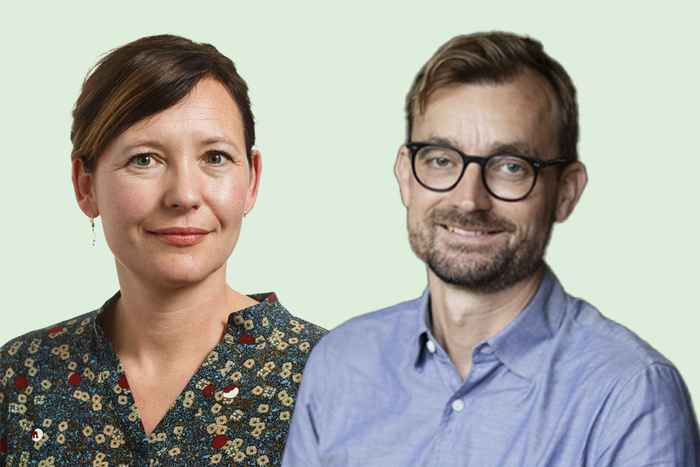The complexity and rewards of an IAS fellowship
Blog by Alumni Fellows Naja Hulvej Rod and Morten Hulvej Rod
22 November 2022

But what an adventure! Thanks to our IAS fellowships and our home institutions’ support of the sabbatical idea, we were able to dive into slow science (and slow family life) for six months. This has been a gift to us, our scientific development, and our family. It was not always easy, but it was certainly rewarding.
IAS was still under lockdown when we started our fellowships, but we were allowed to come into IAS on a regular basis. We quickly set up a routine of being present at IAS most days and actively participating in lunches and events at IAS, when everything opened again. We also networked with several of the in-house research groups (e.g., urban mental health and POPNET). This led to many inspiring conversations and new collaborations that will hopefully develop in years to come. We had regular meetings with Karien Stronks and Federica Russo, who were our closest collaborators at IAS. Karien came to IAS (most) Wednesday mornings during our fellowship, and we simply had coffee and discussed for hours. The scientific and personal commitment from Karien and Federica were extremely rewarding and moved our scientific discussions beyond single papers. Their commitment is one of the secret ingredients to the success of our fellowships.
Scientifically, we set out to explore how to apply complexity theory and systems thinking to public health. Complex public health problems such as health inequalities, mental health, and obesity have long called for a reorientation of public health towards complex systems thinking, but complexity in public health is still a new and emerging field in need of further development.
We wanted to develop something that could help public health researchers, like us, implement complex system thinking into our daily work. Towards this end, we developed an interdisciplinary knowledge production framework for complex health issues. The framework builds upon methodological pluralism and suggests that we need to integrate evidence on patterns, mechanisms, and dynamics to understand the emergence of complex public health phenomena. Maybe the framework could be applied to other fields as well?
Based on conversations with researchers from public health, health policy, epidemiology, philosophy, health promotion and anthropology (at IAS and internationally) we produced a small series of papers on health complexity:
- a comment/viewpoint that introduces a framework for producing and integrating evidence on complex health issues into a systems-oriented public health research agenda;
- a methodological paper which provides a systematic overview of methods and data that can help epidemiologists operationalize complexity thinking in public health;
- a conceptual paper that examines the implications of a systems approach for the development of interventions targeting health inequities.
We also co-authored two op-ed pieces that presented the systems approach and discussed its implications for intervention research in a Danish context.
The academic papers were discussed at an open seminar at IAS in June. They were very well received by a varied audience of researchers, public health professionals and policy makers. We were also joined by three invited discussants to engage with the papers and the health complexity agenda in general: Professor of Global Public Health Harry Rutter (lead author on one of the most cited comments on complexity in public health published in the Lancet in 2017), Professor of Philosophy Alex Broadbent (author of a book on the Philosophy of Epidemiology, an expert on causality), and Professor of Sociology Brian Castellani (complexity science expert and author of chapter on the future of complexity science in public health in a recent textbook on the topic).
Next day, we convened a workshop with a smaller group of invited researchers who were all involved in complexity science and health. The aim of the workshop was to discuss how we can strengthen the uptake of systems approaches in mainstream public health. We ended the two-day meeting with a lot of new inspiration and a list of action points. This will be helpful for the future development of the field and has laid out paths for further collaboration.
We are now back in Copenhagen with our children (who had an amazing time at Amsterdam International Community School meeting new friends from all over the world), our car, the five computers and even more stuff. Including several Ajax gadgets. We feel that we have taken a major step forward scientifically; we have had time to reflect on work life and family life, and we have met so many new friends and collaborators. Thanks to IAS for this outstanding opportunity!
Morten Hulvej Rod
Head of Health Promotion, Steno Diabetes Center Copenhagen
Professor of Health Promotion, University of Southern Denmark
Naja Hulvej Rod
Chair, Section of Epidemiology
Professor of Epidemiology, University of Copenhagen
List of papers/outputs directly related to our IAS fellowship
- Paper: Rod NH, Stronks K, Russo F, Rod MH, Human Health Complexity: A knowledge production
framework for complex public health problems, submitted manuscript. - Paper: Rod NH, Broadbent A, Rod MH, Arah OA, Stronks K. Complexity in Epidemiology and Public Health: studying and acting on complex health problems through a mix of epidemiological methods and data, submitted manuscript.
- Paper: Rod MH, Rod NH, Russo F, Klinker CD, Reis R, Stronk S. Promoting the health of vulnerable populations: Three steps towards a systems-based re-orientation of public health intervention research aimed at reducing health inequities, submitted manuscript.
- Seminar and workshop: Human Health Complexity seminar
- Op-ed piece (in Danish): Rod NH, Rod MH. Der er brug for et paradigmeskifte i interventionsforskningen. Sundhedsmonitor, June 27, 2022.
- Op-ed piece (in Danish): Rod NH, Rod MH. Sådan styrker vi folkesundheden via forandring i systemer. Sundhedsmonitor, June 28, 2022